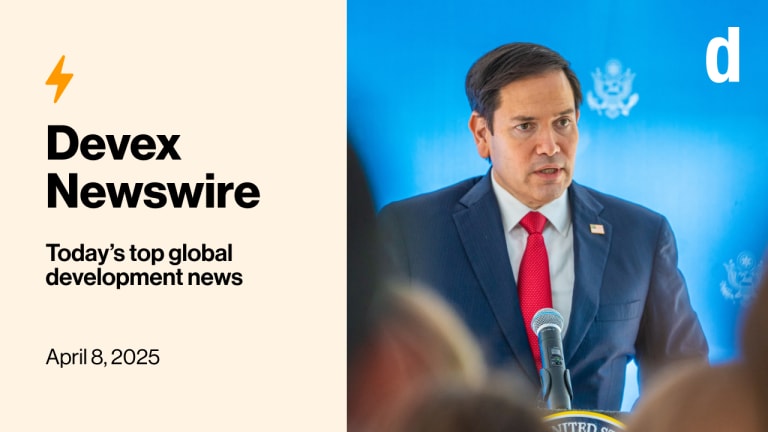
This is a preview of Newswire
Sign up to this newsletter for an inside look at the biggest stories in global development, in your inbox daily.
This morning, the United Nations General Assembly is scheduled to host an “informal dialogue” with candidates to be the next secretary-general. It could be a quick one, since only current U.N. chief António Guterres is attending.
An international organization that is meant to be a beacon for democratic values and global participation is taking heat for failing to live up to those ideals in its own leadership appointment process, Amy Lieberman reports. Guterres remains the only official candidate to lead the U.N. for the term beginning next year, though there are seven other applicants trying to make sense of an opaque process for joining the race.
• Civil society campaigns such as “Forward” and “1 for 7.8 Billion” are trying to open up the secretary-general election process to allow for more competition. Experts say they are running up against a country-based nomination process, in which powerful countries hold sway and the outcome is often a foregone conclusion.
• “Countries are a bit fearful of nominating candidates themselves when they know that at the end of the day, the P5 [permanent members of the Security Council] will be the one deciding,” says Colombe Cahen-Salvador, Forward’s co-founder.
• The U.N. Security Council has said it intends to begin deliberations on the next secretary-general in May or June, and the choice could be made well before the September deadline.
• Many expect Guterres will find a smooth road to reelection. His first term was derailed by having to manage a difficult relationship with the Trump administration, and member states appear committed to seeing more success with a second.
Read: Why the UN chief race might wrap sooner than expected
TRIPPED UP
The Bill & Melinda Gates Foundation has reversed course on COVID-19 vaccine patent protections, announcing Thursday that it now supports “a narrow waiver during the pandemic,” Catherine Cheney reports. CEO Mark Suzman issued the foundation’s endorsement of the policy, on the heels of the Biden administration’s decision to join the push for a waiver at the World Trade Organization.
The announcement caps a tumultuous week for the Gates Foundation. Bill Gates had been under fire for arguing against lifting COVID-19 patent protections, while his and Melinda’s announcement that the billionaire couple plans to divorce has raised major questions about the fate of one of the world’s greatest philanthropic fortunes.
Read: Gates Foundation reverses course on COVID-19 vaccine patents
FRENCH CONNECTIONS
Devex Pro Live
On Monday, Vince will host a conversation with French deputy Hervé Berville and ONE Campaign’s Maé Kurkjian about what France’s new development law means for the country’s aid program. Join them at 9 a.m. ET (3 p.m. CET).
France’s latest legislation on development aid is not just about increased spending, Vince Chadwick reports. The new French aid law also promises a change of model with implications for how and where the country spends its money.
Devex Pro: The changing face of French aid
COULD HAVE, SHOULD HAVE ...
USAID is preparing to unveil a restructured approach to its global health supply chain project, currently the largest contract in the agency’s history. In March, USAID’s inspector general looked into how that contract was designed, awarded, and managed — and shared some recommendations for the next time around.
“We recognize the vulnerabilities presented by a single-source contract that is ‘too big to fail’ because millions of people depend on the life-saving medicines and health products USAID buys through it ... we could, and should, have done it better,” USAID wrote, in response to the audit.
Devex Pro: USAID rethinks contracts that are 'too big to fail'
ACTIONS VS. WORDS
“These are great pronouncements. But they fly in the face of the reality that we’re being asked to enact at the moment, which is to close down very good projects working on precisely the issues described as what the G-7 want to focus on in extremely impoverished communities.”
— Tom Dannatt, CEO at Street ChildForeign and development ministers from the G-7 group of nations concluded their summit — hosted by the U.K. — with a communiqué that championed girls’ education; famine prevention and humanitarian crises; and COVID-19 and pandemic preparedness. But the rhetoric on girls’ education “makes no sense” in the context of funding cuts to those same programs, Will Worley reports.
IN OTHER NEWS
Malawi wants some 2,000 refugees already integrated into society to relocate to the overcrowded Dzaleka camp, citing security concerns. [BBC]
A surge in COVID-19 cases in northeast Syria is straining the region's health infrastructure, aid agencies have warned. [Washington Post]
Human rights groups are decrying a UAE official’s candidacy for leadership of Interpol, citing reports that Ahmed al-Raisi has overseen prisoner torture. [Al Jazeera]
Sign up to Newswire for an inside look at the biggest stories in global development.




